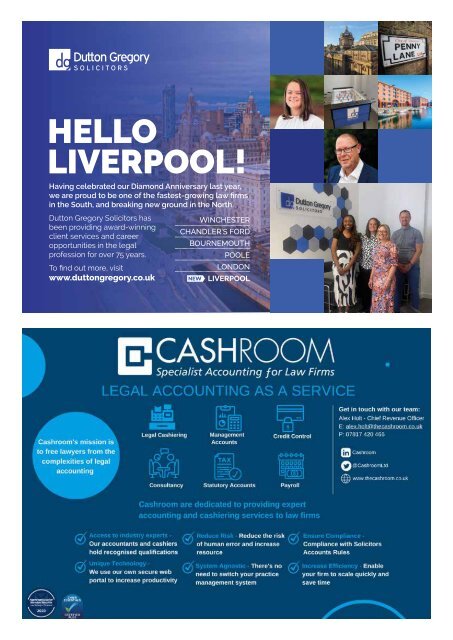Modern Law Magazine Issue 67
You also want an ePaper? Increase the reach of your titles
YUMPU automatically turns print PDFs into web optimized ePapers that Google loves.
EDITORIAL<br />
BOARD<br />
Paul Sams,<br />
Partner, Dutton Gregory<br />
Alex Holt<br />
Director of Business<br />
Development,<br />
The Cashroom<br />
HELLO<br />
LIVERPOOL!<br />
Having celebrated our Diamond Anniversary last year,<br />
we are proud to be one of the fastest-growing law firms<br />
in the South, and breaking new ground in the North.<br />
Dutton Gregory Solicitors has<br />
been providing award-winning<br />
client services and career<br />
opportunities in the legal<br />
profession for over 75 years.<br />
To find out more, visit<br />
www.duttongregory.co.uk<br />
WINCHESTER<br />
CHANDLER’S FORD<br />
BOURNEMOUTH<br />
NEW<br />
POOLE<br />
LONDON<br />
LIVERPOOL<br />
Leading<br />
By Example<br />
“In recent months, I have started to wonder if the<br />
main objection to environmentally friendly practices<br />
isn’t, in fact, the solution - price. We all know that<br />
clients want a five-star hotel service, but are only<br />
prepared to pay the price of cardboard box under<br />
a railway arch, but could this be used to help the<br />
promotion and adoption of the green agenda? Can<br />
we incentivise clients to adopt environmentally<br />
friendly ways of working? Why not offer reduced fees<br />
or discounts to clients who accept correspondence<br />
electronically, (reducing paper) are happy to have<br />
video meetings (reducing use of vehicles) or need<br />
legal support on issues of employment, manufacturing<br />
and transport that support a greener future?<br />
Perhaps more importantly, law firms should lead by example<br />
and start implementing sustainable practices within their own<br />
operations. This can include reducing paper usage, implementing<br />
recycling programs, and adopting energy-efficient technologies.<br />
Only companies that can demonstrate their own commitment<br />
to sustainability are in a position to encourage others. We could<br />
include sustainability clauses in client contracts and agreements,<br />
making it a requirement for those we represent to adhere to<br />
certain environmental standards.<br />
Once that is achieved, the next key element is education. <strong>Law</strong><br />
firms can organise workshops, webinars, or record videos to<br />
showcase the benefits of adopting environmentally friendly<br />
practices. They can also provide resources such as guides,<br />
checklists, and case studies to help clients understand the<br />
steps that can be taken to become more sustainable. We can<br />
partner with environmental organizations to provide clients with<br />
access to expertise and resources, helping clients understand<br />
the environmental impact of their practices and identify<br />
opportunities for improvement. I know I certainly benefited<br />
from hearing the range of speakers at the Momentum and 360<br />
Hub Liverpool Sustainability Conference I attend recently in<br />
Liverpool City Centre.<br />
By adopting these strategies, law firms can effectively<br />
encourage their clients to adopt more environmentally friendly<br />
practices. Through incentives, education and collaboration, law<br />
firms can play a vital role in promoting sustainability and driving<br />
positive change in the legal industry. I think it is increasingly<br />
something that clients are paying attention to, so should be<br />
seen as an investment in the future or else be left behind.”<br />
How can the legal industry<br />
contribute to the development<br />
of innovative legal solutions<br />
that address environmental and<br />
ethical concerns while ensuring<br />
business continuity?<br />
There’s a constant balancing act for law firms as they<br />
seek to address environmental and ethical concerns.<br />
There is the challenge of providing the best possible service to<br />
their clients. Clients’ demands have never been more exacting,<br />
with speed of communication and cost efficiency paramount.<br />
They must operate within strict regulatory guidelines and<br />
regimes, both sector specific and wider regulations such as<br />
GDPR and AML, which are part of an ever changing geopolitical<br />
landscape - constantly tightening and evolving.<br />
They are overwhelmed by technological advances- new practice<br />
management systems, data storage, paperless functionality and<br />
the ever increasing threats from cyber criminals. And don’t even<br />
get me started on the lawyers’ concerns about the likely impact<br />
of Artificial Intelligence!<br />
They face huge challenges around staffing and recruitment,<br />
exacerbated by the requirement for hybrid working from<br />
particular generations, with the inherent challenges of creating<br />
and maintaining a firm’s culture in those circumstances.<br />
Taking all these elements into account, and more, how on earth<br />
are they to address environmental and ethical concerns as well?<br />
Well…as with many things they need to begin by considering<br />
the steps they will have already, almost unknowingly, made.<br />
Using any practice management system will have brought about<br />
communication improvement and better processes generally<br />
from which their staff and their clients will have benefitted. The<br />
same tech enabled processes will almost certainly have enabled<br />
digital document storage and archiving, and paperless (or paper<br />
light) process adoption. Aside from being a cost saving move,<br />
the environmental benefits across the legal sector are huge.<br />
Many firms have now, as standard, inhouse CSR teams,<br />
focusing on societal improvements they can be part of. When<br />
recruiting Gen Y and Gen Z, a firm’s CSR approach will be a huge<br />
attraction- there is a desire among those generations to get<br />
involved with environmental and ethical issues, and some will be<br />
actively attracted to the firms that have the best opportunities for<br />
charity and environmental initiatives. These staff will in fact help<br />
drive the forward thinking that might otherwise be challenging.<br />
<strong>Law</strong> firms are not alone in facing these challenges, but from the<br />
work I’ve done judging many awards over recent years, I can say<br />
with certainty that these issues are deemed incredibly important<br />
by a growing number of firms. Their willingness to embrace<br />
this is in fact reaping benefits as they attract and retain better<br />
staff and as a result look to the future with a renewed and more<br />
steady confidence.<br />
25
















